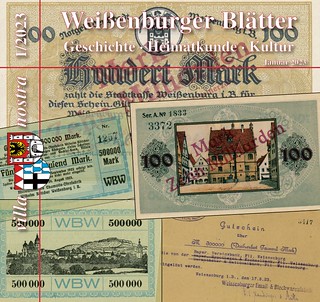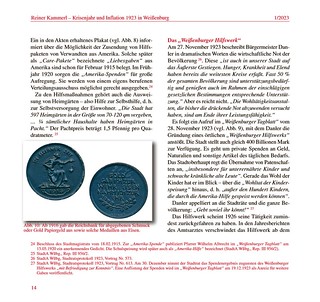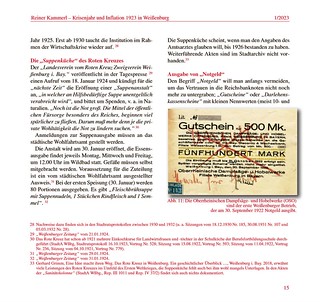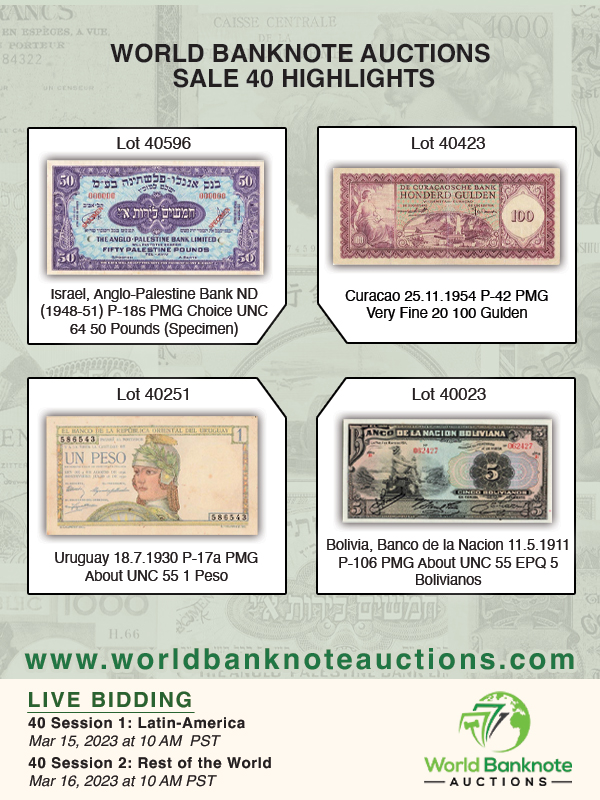
PREV ARTICLE
NEXT ARTICLE
FULL ISSUE
PREV FULL ISSUE
NEW BOOK: 1923 WEISSENBURG INFLATION MONEYHere's a Google-translated article from Geldscheine Online about a new (free!) book on the 1923 inflation money of Weissenburg, Germany. -Editor
35 pages, illustrated in colour, format 200 x 210 mm, soft cover with staples; Free delivery by the city administration: https://www.weissenburg.de/kontakt/ Free PDF download: https://www.weissenburg.de/villa-nostra/ 100 years ago German inflation peaked. Since the beginning of the war in 1914, the value of the mark has steadily decreased and from August 1923 it was in free fall. The currency was not stabilized until November with the help of the Rentenmark.
The Weißenburg city archivist Reiner Kammerl recalls the German hyperinflation of 1923 in the context of the Kammerl is not only limited to the year 1923, but also reports on measures taken by the city and by organizations with which the needy were supported: people's kitchen, Weißenburg relief organization, soup kitchen of the Red Cross. Of course, emergency money takes up the largest part of the booklet. First, the author explains what is meant by emergency money and then gives a brief overview of the different eras of emergency money. Then he deals with the emergency money issues of the city of Weißenburg, beginning with the wartime emergency money notes with the issue date of 11 December 1916 and the 50 Pfennig war coin from 1918/19. This is followed by an account of a failed emergency money project from 1921 and the emergency money notes of 1922. The various issues of hyperinflation follow. The last group of city emergency money includes the notes denominated in gold marks, which, according to the city council decision of December 18, 1923, should primarily be used to collect the old paper emergency money and to pay salaries and wages to city officials and workers. Finally, the redemption of the municipal emergency money is reported. The emergency money notes from Weißenburg companies are presented as an appendix, so to speak. Kammerl remarks that the municipal coffers were instructed not to accept company certificates and that this is probably the reason why only a few issues have survived in the municipal collections. The conclusion is the camp fee of the officers' prison camp at the Wülzburg Fortress. The author does not intend to replace an emergency money catalog with this issue. It is primarily aimed at interested citizens of the city of Weißenburg, but collectors will also be pleased with the colored illustrations of the notes and the detailed background information. The booklet was published in an edition of 2,500 and is distributed free of charge by the city administration, but it can also be downloaded free of charge as a PDF.
To read the complete article, see:
Wayne Homren, Editor The Numismatic Bibliomania Society is a non-profit organization promoting numismatic literature. See our web site at coinbooks.org. To submit items for publication in The E-Sylum, write to the Editor at this address: whomren@gmail.com To subscribe go to: https://my.binhost.com/lists/listinfo/esylum All Rights Reserved. NBS Home Page Contact the NBS webmaster 
|



